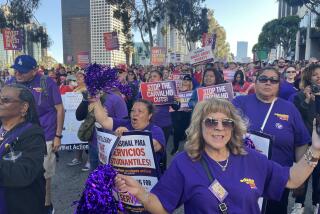Teachers Union Calls for Strike in L.A. Feb. 22
- Share via
The leaders of United Teachers-Los Angeles voted Monday to recommend that teachers reject the Los Angeles school board’s final contract offer and go on strike Feb. 22, at the start of the spring semester.
The district’s 35,000 teachers, nurses, counselors and librarians will vote next week on whether to follow the recommendation and walk out, or accept the proposed contract, which would bring teacher pay cuts to a total of 12%.
“I think it was a vote that came out of frustration, depression, demoralization and most of all anger at the insensitivity of how (negotiating) has been handled,” UTLA President Helen Bernstein said. “We had a number of non-monetary items on our list. The district didn’t offer us even one. It was like we were talking to ourselves for three weeks.”
Bernstein said she foresees a “lengthy strike” if teachers vote to walk out. “It could be anywhere from a week to six weeks. I don’t know. But they’ve got to get us back in once we go out,” she said.
She said that she does not think anybody wants a strike. “But,” she added, “ as one teacher said to me: ‘We can’t afford to strike, and we can’t afford not to.’ ”
The proposed contract includes incentives that could cushion the pay cuts by offering bonuses if specific attendance and other goals are met. But it stops short of providing a guarantee that teacher pay will not be cut again next school year.
That has been a key sticking point in negotiations, with union leaders insisting that anything less than a firm guarantee will lead to a strike.
A similar contract offer was rejected by the teachers in October, with 89% of the 22,069 teachers who cast ballots authorizing union leaders to call a strike.
Monday’s recommendation to set a strike date was made on a unanimous vote of the union’s 50-member governing board. Union members typically follow the board’s recommendations on labor issues, said UTLA spokeswoman Catherine Carey.
In addition, the union leaders voted to ask the state Public Employment Relations Board to step in and nullify the pay cut, contending that the district has engaged in unfair labor practices. At a preliminary hearing Thursday, the state labor board will hear both sides on the issue and set a final hearing for later this month.
With the nation’s second-largest school district reeling under its worst financial constraints in recent history, this year’s protracted contract negotiations have yielded only bitter fruit--leading to the resignation this fall of the district Supt. Bill Anton, a widening rift between teachers and the unions representing other employees, and a court battle that threatens to plunge the district into bankruptcy.
While both sides agree that the financial crisis is real, union leaders complain that more could be done to protect the classroom from the $400 million in cuts made this year.
In 1989, the last time teachers walked out, the strike lasted nine days and led to a three-year contract that delivered an 8% annual raise and an agreement that gave teachers more say in running their schools. But that power-sharing plan is virtually defunct and the raise is being blamed in some quarters for the district’s financial woes.
Last year, all employees had their salaries cut by 3% to cover the district’s budget shortfall. This year, additional cuts ranging from 6.5% to 11.5% were enacted for all employees. The teachers’ reduction was 9%, bringing their cumulative cut to 12%. The other employee groups already have agreed to contracts that include the pay cuts.
Union leaders opted not to schedule the walkout for this month for fear that a prolonged strike could stretch into the eight-week holiday break that begins late this month, meaning teachers would not be paid for any of that vacation time. Most schools are back in session in February.
The next two months would also give teachers time to prepare--both financially and emotionally--for the prospect of a long and bitter walkout, Carey said.
“We don’t want to be leading them down a strike path,” she said. “They’ve got to understand . . . it’s not a one-day act of bravado, it’s a serious decision, as much because of the (financial) problems we’ll face next year as because of what we’re feeling this year.”
Teachers who plan to strike can use the coming months to earn or save the money they will need to survive during a walkout, Carey said.
School board President Leticia Quezada said even the certainty of a February strike probably would not produce a better contract offer from the district.
“It doesn’t change anything,” Quezada said. “We have tried to make it very clear that this district doesn’t have any money. The only reason for having to implement these pay cuts is the financial situation of the district, and that financial situation is not going to change between now and February, strike or no strike.”
More to Read
Sign up for Essential California
The most important California stories and recommendations in your inbox every morning.
You may occasionally receive promotional content from the Los Angeles Times.













